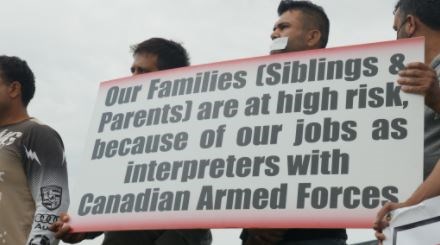They risked everything to help Canada’s armed forces build a new Afghanistan. Now, Afghan interpreters in Canada say the government needs to step up and save their families left behind.
Dozens staged a hunger strike at Parliament Hill Wednesday, September 15, saying they wouldn’t leave without answers.
“We served this country,” said former interpreter Vesal Naser. “We worked together with their army. We lost our brothers, we lost our families."
“They keep killing our family. I lost three of my siblings, I don’t want to lose more.”
Former interpreters say they want a dedicated line to Immigration, Refugees, and Citizenship Canada (IRCC). Emails to the general inbox have gone unanswered.
The strikers say because Kabul airport is up and running, Canada should be landing its own planes to evacuate people.
Naser says, while Canada has promised to evacuate families of interpreters, none of his friends or colleagues have seen a single family member of theirs among those brought to Canada.
“I came from Vancouver. I’m not going to go back until they answer me,” said Naser. “I’m going to sleep right here until they answer me. I’m not going to eat anything until they take me to the hospital. Until I die. Doesn’t matter. If my family’s dying there, let me die.
“Minister of Immigration is key, promising us he’s bringing 20,000 people. But I didn’t see my family. I didn’t see any interpreter’s families. There’s all of us, I didn’t see even one single interpreter’s family here. So where is that?”
Zahed, also a former Afghan interpreter from Calgary, and worked for the Canadian forces for six years.
Zahed, who wouldn’t give his full name, says he’s still concerned for family in Afghanistan. He says if the Taliban recognizes him, they’ll retaliate against his family.
One of his brothers is now in a refugee camp in Turkey, while the other hasn’t been heard from in weeks.
“We are most exposed to the Taliban,” he said. “For a long time. Most of these guys worked from 2001 all the way to 2012. And we were on their hit list since then.
“Please help us. We helped you. We were on the frontlines with Canadian forces.”
